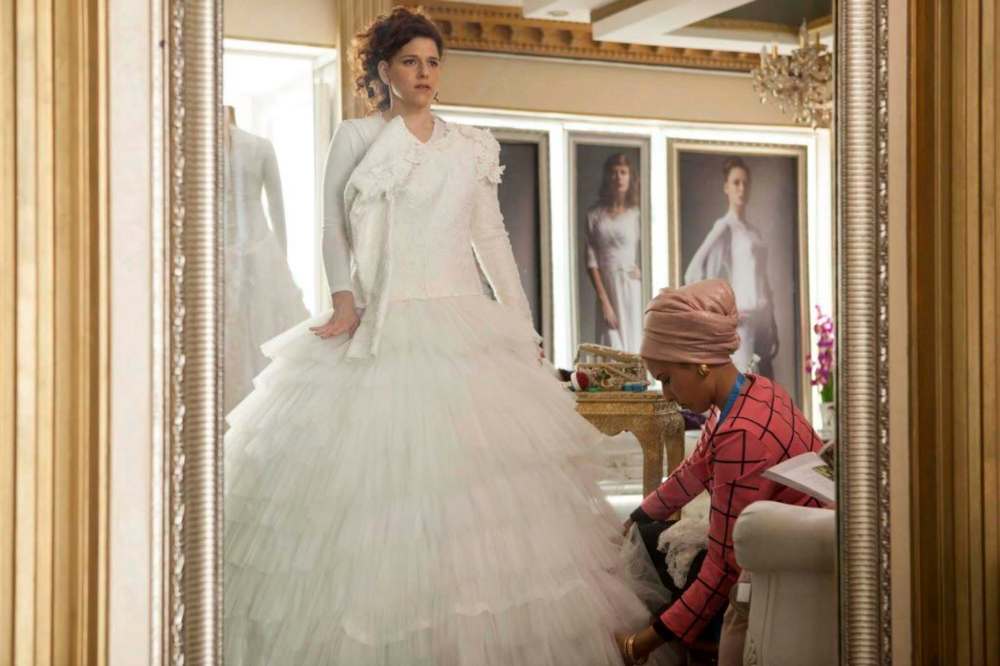Not your typical romcom
The Wedding Plan rises above tropes thanks to likable lead, dialogue
Advertisement
Read this article for free:
or
Already have an account? Log in here »
To continue reading, please subscribe:
Monthly Digital Subscription
$0 for the first 4 weeks*
- Enjoy unlimited reading on winnipegfreepress.com
- Read the E-Edition, our digital replica newspaper
- Access News Break, our award-winning app
- Play interactive puzzles
*No charge for 4 weeks then price increases to the regular rate of $19.00 plus GST every four weeks. Offer available to new and qualified returning subscribers only. Cancel any time.
Monthly Digital Subscription
$4.75/week*
- Enjoy unlimited reading on winnipegfreepress.com
- Read the E-Edition, our digital replica newspaper
- Access News Break, our award-winning app
- Play interactive puzzles
*Billed as $19 plus GST every four weeks. Cancel any time.
To continue reading, please subscribe:
Add Free Press access to your Brandon Sun subscription for only an additional
$1 for the first 4 weeks*
*Your next subscription payment will increase by $1.00 and you will be charged $16.99 plus GST for four weeks. After four weeks, your payment will increase to $23.99 plus GST every four weeks.
Read unlimited articles for free today:
or
Already have an account? Log in here »
Hey there, time traveller!
This article was published 08/09/2017 (2985 days ago), so information in it may no longer be current.
Here’s the high-concept premise behind this lovely little Israeli film: when her fiancé backs out just a month before the wedding, the determined Michal (Noa Koler) refuses to cancel. The wedding hall and the dress are ready to go, and she’s confident a groom will show up — some way, somehow.
Now, if this were a standard Hollywood romcom, you can imagine all the madcap hijinkery that would ensue.
Instead, Israeli director Rama Burshtein (Fill the Void) has crafted an intelligent, feeling and frequently unexpected human comedy.

Movie review
The Wedding Plan
Starring Noa Koler
Cinematheque
G
110 minutes
Four stars out of five
The broad outlines of The Wedding Plan (in Hebrew, with subtitles) will still be recognizable to anyone who’s ever seen a conventional movie love story. (Or read Jane Austen.) In fact, there’s a good chance you’ll be able to guess who shows up for Michal’s big day.
But getting there makes for an interesting roundabout journey, mostly because of several long conversations — between Michal and her sister, mother, friends and roomies, her matchmaker, her rabbi and various (theoretically) marriageable men — that are remarkable for their realness and richness.
Like Menashe, the recent Yiddish-language indie film set in a Hasidic community in Brooklyn, this is an unorthodox Orthodox film.
Michal is an observant Jewish woman, and she is trusting God to send her a husband by the scheduled date, which also happens to be the last night of Hanukkah. When a friend suggests Michal is expecting a miracle on demand, she replies that she’s not testing God, but her own faith.
“You can see the distinction there,” she says to her rabbi.
The film is especially fortunate in its star, who won the Israeli version of an Oscar for her performance. Koler is irresistibly watchable, right from an astonishing opening scene, when she confesses to a matchmaker what she really wants. Hint: it’s not marriage. Or not just marriage. But it’s also marriage. She’s not quite sure.
Michal has a “nutty energy,” as one date calls it, but she’s not the usual romcom ingenue. She’s a crackling and contradictory bundle of vulnerability, toughness and aching honesty.
The Wedding Plan works as character study, as social comment and as a showcase for some truly terrible Israeli pop music — though there turns out to be a reason for that later on.
Director Burshtein is both morally serious and subtly funny, overcoming the clichés of romantic comedy with a sideways exploration of the nature of love and faith.
alison.gillmor@freepress.mb.ca

Studying at the University of Winnipeg and later Toronto’s York University, Alison Gillmor planned to become an art historian. She ended up catching the journalism bug when she started as visual arts reviewer at the Winnipeg Free Press in 1992.
Our newsroom depends on a growing audience of readers to power our journalism. If you are not a paid reader, please consider becoming a subscriber.
Our newsroom depends on its audience of readers to power our journalism. Thank you for your support.


